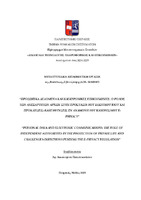Προσωπικά δεδομένα και ηλεκτρονικές επικοινωνίες : ο ρόλος των ανεξάρτητων αρχών στην προστασία του ιδιωτικού βίου και προκλήσεις - Κατευθύνσεις εν αναμονή του κανονισμού e-privacy

View/
Keywords
e-Privacy ; ΑΠΔΠΧ ; ΑΔΑΕ ; Ηλεκτρονικές επικοινωνίες ; Προσωπικά δεδομένα ; ne bis in idem ; ΑπόρρητοAbstract
This thesis examines the protection of personal data and private life in the field of electronic communications, with a particular focus on the role of independent authorities and the challenges arising from the overlapping nature of their responsibilities. Through an analysis of the constitutional, European, and international legal frameworks, it explores how the right to privacy is safeguarded and what institutional mechanisms are in place to enforce that protection.
The issue of privacy protection has emerged as a central concern in the digital age, especially in light of the rapid pace of technological development and the growing reliance on electronic means of communication. This study aims to assess the current legal framework, highlight the gaps and implementation challenges it presents, and propose potential solutions and directions for reform.
A key part of the analysis centers on the proposed ePrivacy Regulation, which was intended to modernize and strengthen privacy protections in the realm of electronic communications, while also replacing the outdated Directive 2002/58/EC. The thesis presents the core provisions of the Regulation, its interaction with the GDPR, and the political and procedural reasons that led to its withdrawal by the European Commission in 2025. This development has left the obsolete Directive 2002/58/EC still in effect, reigniting debate around the legal gap and the urgent need for a renewed regulatory approach.
Special attention is given to the structure and functions of the Hellenic Data Protection Authority (HDPA) and the Hellenic Authority for Communication Security and Privacy (ADAE), as well as the potential for merging the two. The thesis explores the institutional, legal, and practical complications arising from their coexistence, including the frequent difficulties in applying the principle of ne bis in idem in cases involving parallel sanctions.
Overall, the study highlights the critical importance of safeguarding personal data in electronic communications, the emerging challenges posed by ongoing technological advances, and the legislative steps needed to ensure meaningful protection of private life in today’s digital environment. By analyzing both current and proposed legal instruments, the thesis seeks to identify areas in need of reform, suggest practical responses, and contribute to a more balanced and effective framework for privacy in electronic communications.


